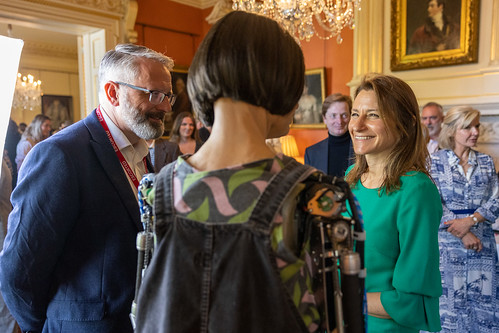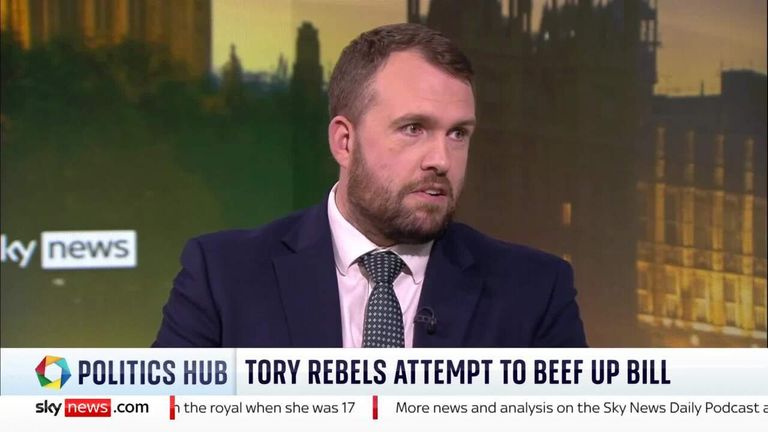Lucy Frazer questioned about BBC bias, as government accused of ‘culture wars’ over impartiality reforms
Lucy Frazer #LucyFrazer

The government has been accused of using the BBC as a “punching bag” after a minister said the corporation has “on occasion” been biased – but then was unable to provide examples of this.
Labour said Lucy Frazer’s interview with Sky News showed she was the “latest in a long line of Secretaries of State for Culture Wars”, and the government is intent on “attacking and undermining” the BBC.
Ms Frazer was asked several times if she believes the BBC has shown bias, in light of government reforms aimed at boosting public confidence in the public service broadcaster.
She said that “on occasions it has been biased”, citing its reporting of a hospital attack in Gaza.
It was put to her that a mistake is not the same as bias and Ms Frazer agreed, going on to say that “there is a perception amongst the public that the BBC is biased”.
When it was put to her that perceptions are not necessarily reality, Ms Frazer said: “There are only perceptions and perceptions are important.
“What’s important about the BBC is that it’s funded by the public, so the perception of audiences, of the public, are important.”
Ms Frazer refused to say which other broadcasters she believed might be impartial, saying they were in “totally different positions” from the publicly funded corporation.
Labour’s shadow culture secretary Thangam Debbonaire criticised her remarks, posting on X: “Just the latest in a long line of Secretaries of State for Culture Wars.
“Attacking and undermining one of our greatest institutions at every chance they get.
“Instead of using it as a punching bag the government should be supporting the BBC to create wealth, jobs and joy.”
Image: Culture Secretary Lucy Frazer says the reforms will improve accountability and public confidence
Ofcom oversight to be extended to BBC News articles
The reforms, announced as part of the BBC mid-term review, would give media regular Ofcom more powers over the BBC’s online services, including its news website and YouTube channel.
Currently, the communications watchdog regulates the BBC’s TV, radio and on-demand output, but not other elements of its online content.
The government said oversight should be extended to digital services to enable the regulator to hold the BBC to account “in a more robust way”.
Read More:BBC chair resigns after Boris Johnson £800,000 loan rowVorderman leaves BBC radio show over new social media guidelinesLineker row ‘is like something from Putin’s Russia’, claims Labour
This could see Ofcom granted powers to take enforcement action over BBC News website articles it does not believe meet relevant broadcast standards.
If a broadcaster breaks the rules repeatedly, or in a way considered to be serious, Ofcom has the legal powers to impose sanctions on them, such as fines.
The watchdog has also been given a new legally binding responsibility to review more of the BBC’s complaints decisions.
Alongside this is a legal responsibility for the BBC Board to actively oversee its own complaints process.
1:10 MP challenges Lineker to stand in Stoke seat
‘Impartiality an ongoing issue for audiences’
The mid-term review concluded the current complaint’s process, called BBC First, does allow licence fee payers to hold the corporation directly accountable, but said impartiality continues to be an ongoing issue for audiences.
The changes are designed to “enhance the independent scrutiny of its complaints handling and improve the experience of viewers who make a complaint”.
The government said its recommendations are expected to be implemented “in a timely manner”, following talks with the BBC and Ofcom.
Ms Frazer said the BBC “needs to adapt” to the reforms or risk “losing the trust of the audience it relies on”.
A spokesperson for the BBC said “no other organisation takes its commitment to impartiality more seriously”.
They added: “During discussions over the mid-term review, we proposed and implemented a number of reforms, including strengthening our complaints procedures, which now form part of the conclusions.
“We are pleased the government has fully taken our proposals onboard. We remain committed to continuous improvement to ensure we deliver for all licence fee payers.”
The impartiality of the BBC came under increased scrutiny last year following a number of high-profile incidents.
There was outrage when Match Of The Day host Gary Lineker was briefly taken off air following a tweet about the government’s asylum policy, forcing the BBC to change its social media guidelines.
It also faced an impartiality row after it emerged former chairman Richard Sharp, who has since resigned, broke the rules by failing to disclose the role he played in helping Boris Johnson secure an £800,000 loan.
 1:10 MP challenges Lineker to stand in Stoke seat
1:10 MP challenges Lineker to stand in Stoke seat